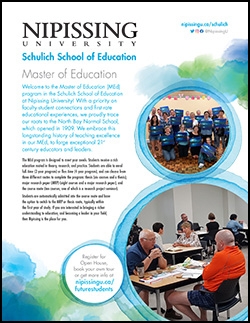




The Master of Education (MEd) program is designed to prepare educational leaders for learning environments such as classrooms, schools and other learning organizations. The program is ideal for education, healthcare and other professionals.
The program is offered on a full-time and flexible full-time (flex-time) basis. The flex-time option is intended to allow working professionals to be engaged in continued employment in areas related to the fields of research. The Master of Education program is designed to be completed online and all MEd courses are offered online. Students may have the opportunity to register in select interdisciplinary on-campus courses at Nipissing University but these offerings are not guaranteed. The full-time MEd Program is a two-year program. Students in the flex-time option may complete within 3-4 years.
Our MEd students tell us that they appreciate the program’s flexibility. In addition to the low faculty-to-student ratio, the program structure allows working professionals to continue with full-time or part-time employment.
Our MEd students
Choose
Full-time
(2-year program)
or
Flex-time
(4-year program)
Choose:
Thesis
(6 courses and a thesis)
Major research paper
(8 courses and a major research paper)
Course route
(10 courses, one of which is a research project seminar)
Master of Education (MEd)
Application Process:
Admission Requirements, How to Apply, Admission Process and Registration Status
Prospective MEd Student FAQs ❯
Finances:
Degree Requirements:
Funding and Financial Aid
Scholarships, Bursaries and Awards
Funding is available to graduate students from both internal and external sources. Internal funding includes teaching/research assistantships, faculty research grants, and Nipissing Graduate Scholarships. The value of these scholarships varies. Students are also encouraged to compete for scholarships from the Social Sciences and Humanities Research Council (SSHRC), the Natural Science and Engineering Research Council (NSERC), the Canadian Institutes of Health Research (CIHR), the Ontario Graduate Scholarships (OGS), the Canada Graduate Scholarship, and the Mackenzie King Memorial Scholarship.
Full vs Flex time
The Master of Education program operates on a trimester basis with courses available in the Fall, Winter and Spring/Summer terms. All Master of Education courses are delivered online through Blackboard.
Full-time M.Ed.
- Six (6)terms (2-years) of continuous full-time enrolment.
- Tuition required for a minimum of six (6) terms.
- Degree extension available.
Flexible Time M.Ed.
- Six (6) terms (2-years) of continuous full-time enrolment.
- Tuition required for a minimum of six (6) terms.
- Up to six (6) additional terms of continuous enrolment during which only ancillary fees would be applicable
- Degree extension available.
| Scholarship Funding | Eligible for scholarship funding. May not work more than 10 hrs/wk for the University. |
|---|---|
| Year 1 | Term tuition fees and ancillary fees applicable |
| Year 2 | Term tuition fees and ancillary fees applicable |
| Year 3 | Degree extension required each term for a maximum of three (3) terms -$1000 plus ancillary fees per term |
| Year 4 | N/A |
| Year 5 | N/A |
| Scholarship Funding | Not eligible for scholarship funding. No restriction to number of hours worked for the University |
|---|---|
| Year 1 | Term tuition fees and ancillary fees applicable |
| Year 2 | Term tuition fees and ancillary fees applicable |
| Year 3 | Ancillary fees applicable |
| Year 4 | Ancillary fees applicable |
| Year 5 | Degree extension required each term for a maximum of three (3) terms - $1000 plus ancillary fees per term |
As a graduate student, it can often be a daunting task to try to identify a member of the Education faculty who is both eligible to supervise a thesis or major research paper (MRP), and who has the time, interest and skills needed to see the research through to successful completion. One important source of support in the identification of a supervisor is the graduate student’s faculty advisor, who was assigned to the student at the time of her or his admission to the MEd program.
The lists that follow identify all the current full or associate members of the graduate faculty in Graduate Studies in Education who are eligible to supervise or co-supervise MEd thesis or MEd MRP research, and the specific areas of interest and expertise in which they are willing to act as supervisors, co-supervisors or internal second readers. Graduate students and faculty advisors are encouraged to consult with each other and these lists to help expedite the process of bringing the student and supervisor together to engage in a fulfilling and successful research experience.
Graduate Program Coordinator
- Extension4359EmailWebsite—
Graduate Program Faculty
- Extension4432EmailWebsite—
- Extension4582EmailWebsite
- Extension4736
- Extension4392EmailWebsite—
- Extension4526Website—
- Extension4456Website
- Extension4068EmailWebsite
- Extension4405Website
- Extension4144EmailWebsite—
- Professor, Interim Associate Dean, Schulich School of EducationMaster of EducationExtension4173Website—
- Extension4269Website—
- Extension4091EmailWebsite
- Extension4116Website—
- Extension4384EmailWebsite—
- Extension4445EmailWebsite
- Associate Vice-President, Research, Innovation and Graduate Studies, ProfessorMaster of EducationExtension4293EmailWebsite
- Extension4124Website—
- Extension4470Website—
- Extension4844Website—
- Extension4460EmailWebsite—
- Extension4388EmailWebsite—
- Extension4423Website—
- Interim Associate Dean, School of Nursing, Associate ProfessorMaster of EducationExtension4552EmailWebsite—
- Extension4611Website—
- Extension4424Website—
- Extension4815Website
- Extension4187EmailWebsite—
- Extension4117EmailWebsite—
- Extension4731EmailWebsite—
- Extension4403Website
- Extension4170EmailWebsite—
- Extension4653
- Extension4503
- Extension4580Website—
- Extension4260EmailWebsite
- Extension4285Website—
- Extension4126Website—
- Extension4914EmailWebsite—

Nipissing University not only provides its graduate students with attentive faculty and a supportive community, but also offers physical spaces that are conducive to productive research.
Our graduate students study and teach in state-of-the-art classrooms, seminar rooms, and research labs. Our graduate student lounge and interdisciplinary office provides students with their own dedicated space to meet and collaborate.
The Harris Learning Library was completed in 2011 and provides 56,000 square feet of study space with natural light and a modern award-winning design. The new library features expanded print collections, a learning commons, an adaptive technology area, and collaborative work spaces.
Graduate Student Centre - R229
Nipissing University graduate students have access to an interdisciplinary office facility designed to be a central place for graduate students to study and interact with each other. The Graduate Student Centre totals 833 square feet and is able to accommodate more than 60 students. In addition, the Graduate Student Centre is equipped with a telephone, wireless and hardwired internet, and access to shared printing.
All graduate students are eligible for access to the Graduate Student Centre. Keys are assigned by the Vice-President Operations office, B215. Students are required to pay a $25.00 deposit for a key in the Finance office prior to receiving their key.
There are 30 individual study carrels along the perimeter of the room that are assigned to individual students, or two who request to share. Assignments of designated spaces will be on a first come first serve basis.
Graduate Studies Resources
- Graduate Studies Regulations
- Graduate Studies Procedures
- Graduate Studies Forms
- Graduate Studies Glossary
- Graduate Student Card Application
- Off Campus Library Services
Major Research Paper/Thesis Resources
- MRP/Thesis Defence Process
- MRP/Thesis Supervisory and Examination Committees
- MRP/Thesis Final Submission Process
Master of Education Resources
Post-Graduation Opportunities and Careers
The Master of Education (MEd) program at Nipissing University is applicable to diverse different career opportunities. Graduates go on to become exceptional teachers, leaders and administrators. While many work in schools, school boards, and government positions, others enter academe at colleges and universities (and some go on to complete their PhD in Education (Educational Sustainability) at Nipissing, too), work for sports teams, start their own schools, or attain leadership positions in nursing, social welfare, and business.





































